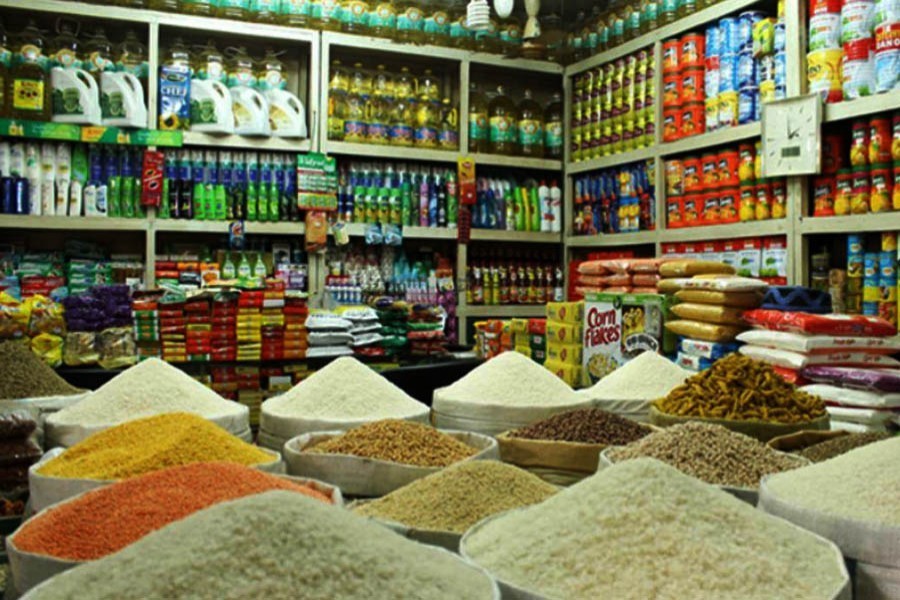The prices of groceries and other daily commodities have yet to see a slide since ticking up last year as sugar, eggs and chicken saw a leap in costs in the latest hike.
Customers also noticed a rise in spice prices with the costs of ginger, garlic, dry chilli, coriander and cloves spiking ahead of the Islamic month of Ramadan, while cardamom, cumin and cinnamon prices fluctuated.
Customers shopping for the commodities on Friday complained that the prices of the necessities never drop once they go up, reports bdnews24.com.
“They said that sugar prices would be raised in February. But it’s already jumped from Tk 115 to Tk 120 a kg today,” said Ebadot Hossain at Shewrapara bazaar.
Bangladesh Sugar Refiners Association increased sugar prices by Tk 5 on Thursday, citing “a hike in production cost, the price of unrefined sugar in the international market and the dollar price”.
The association raised the price of unpackaged sugar by Tk 5 to Tk 107 per kg and packaged sugar by Tk 4 to Tk 112 a kg. The commerce ministry had set the price of unpackaged sugar at Tk 102 per kg and packaged sugar at Tk 108 per kg in November.
Retailers, however, have been selling sugar at Tk 120 kg, saying the market was “out of sugar”.
The prices of rice, flour, lentils and cooking oil showed no signs of dropping either.
Rice of all varieties was being sold at higher prices in the markets across Dhaka. Coarse rice was priced from Tk 50-55 per kg, while the cost of BR-28 stood at Tk 60 a kg. Miniket of different varieties was being sold at Tk 72-75 per kg, while the price of Nazirshail ranged from Tk 80-85.
Shops priced unpackaged flour at Tk 60-65, while packaged flour costs Tk 70-75. The prices of lentils and soybean oil stayed unchanged from last week.
Shahin Alam, an electrician who was shopping in the Kazipara bus stand area, said: “The prices of rice and lentils are too high. Low-income people have a hard time buying anything else when these cost so much. Eggs and broiler chicken cost too much. Forget about beef or country chicken.”
Aslam Mia, who owns a shop in the same area, said: “We have to talk a lot about prices with people now. The prices don’t go down and we can’t sell at a loss if they don’t.”
Ginger prices ranged from Tk 160 to Tk 240 per kg, depending on the quality, while garlic prices rose to Tk 150-180 per kg. Dry chilli cost about Tk 200 per kg two weeks ago but is now priced between Tk 350 and 450.
Wholesale traders mentioned that the spice market relied on imports, so the woes might deepen if importers fail to bring in more.
A spokesman from Moulvibazar’s Habib and Brothers wholesale spice store in Chawkbazar said: “Spices are not coming from abroad. The prices will stay higher if there’s a shortage in the market. The price of cumin had gone up, it’s come down a bit. Prices of cloves are rising, while cardamom already costs more.”
Md Ataur, manager of Shah Ali Enterprises in Mirpur, said: “Chilli powder costs Tk 370 per kg here. Turmeric prices did not go up but coriander did.”
PROTEIN AND VEGETABLE PRICES SOARING
Low-income people usually choose eggs and broiler chicken as a source of protein as the prices of beef and mutton are too high. But price hikes marred these alternatives as broiler chicken prices increased by Tk 10-15 within a week to around Tk 165 per kg.
Egg prices, both white and red varieties, also shot up by Tk 10-15 per dozen to around Tk 120-130.
However, prices of other chicken were stable with Sonali chicken costing within Tk 250-260 per kg and layer chicken being sold at Tk 210-230. Beef prices ranged from Tk 650-750 per kg, while mutton cost Tk 1,000 per kg. The prices of fish, on the other hand, remained quite stable.
Winter vegetable prices briefly provided respite before surging up over the last two weeks. Sellers cited “supply shortage” as the reason.
Meher Nigar who arrived at Shewrapara bazaar to shop for groceries said: “Employees from middle-class families have fixed income but the prices keep fluctuating. We have to keep the family afloat with this income. We’re being very thrifty.”


